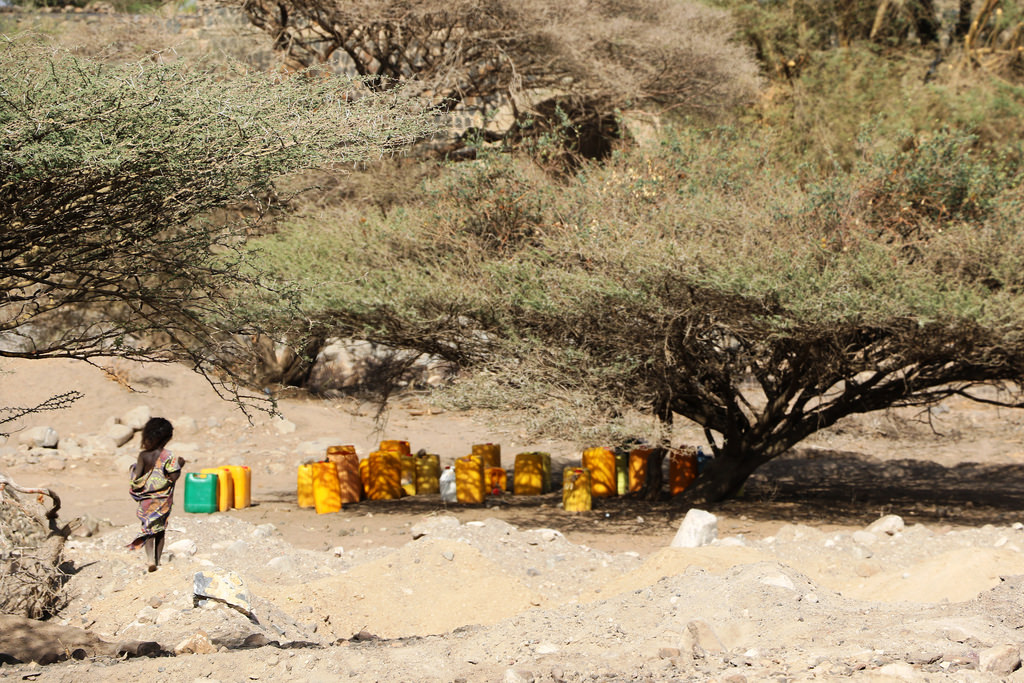News & Updates
Lessons learned from the recent drought response in Ethiopia
04 October 2016

Drought, worsened by El Niño effects, is having a devastating impact on the lives and livelihoods of 10.2 million Ethiopians. The lack of rainfall, and subsequent great drought, has caused a massive spike in humanitarian needs, which are expected to continue through the remaining of 2016 and well into next year.
Close to 200 Government, UN, NGO and donor representatives visited affected communities across Ethiopia’s nine regions to assess humanitarian needs of the people affected by the crisis:


In response to the crisis, the joint government and humanitarian partners’ report Humanitarian Requirements Document (HRD) for 2016 was developed to include specific operational plans based on rain projections and analysis of past El-Niño events in Ethiopia. To ensure appropriate inter-sector coordination, it has been built around three pillars:
Save lives and reduce morbidity related to drought
- Ensuring access to safe drinking water underpins all efforts
- Monthly screening and food distribution to reach the most vulnerable
- Increase immunization coverage to prevent potential for disease outbreaks
Protect and restore livelihoods
- Ensuring that at risk livelihoods can be protected
- Supporting livestock survival through the provision of fodder, access to drinking water and vaccination
- Timely access to seeds and fertilizer to enable families to take advantage of the 2016 rains
Prepare for and respond to natural disasters, conflict and displacement
- Contingency plans to support an estimated 210,600 people that might be affected by La Niña flooding and 105,300 people at risk of displacement
- Prevent communal conflict when people are forced to move in search for water and pasture
“If properly resourced, the HRD for 2016 will be the basis for a well-coordinated and prioritised humanitarian response that saves many lives and livelihoods. The HRD also commits us to stronger monitoring, which we hope will help us prioritise our support to those most in need and areas most affected.” - Ms. Ahunna Eziakonwa-Onochie UN Resident and Humanitarian Coordinator
Some of the learnings that emerged from the HRD for 2016 include:
- Three month lead times for the procurement and delivery of food and other assistance - any new funding contribution will take this time to materialize as assistance in the hands of beneficiaries
- Aid recipients shared assistance provided - communities will ensure that the most needy in their midst will have access to available aid
- Food price inflation - WFP market analysis indicates that food prices on average have risen between 11 and 18 per cent, therefore localized inflation need to be closely monitored, especially in areas where cash transfers are being considered instead of food aid
- Continuing ‘unseasonal’ migration and displacement – there’s a high potential for displacement of whole communities due to lack of available drinking water and in search of pasture for livestock.
- Ensuring timely procurement and distribution of seeds to areas benefiting from the different rainy seasons across the country
- Drinking water interventions are critically enabling, without them the rest of the multi-sector response would not be possible
- Programmes need to include female community members - consideration of gender that takes into account the different vulnerabilities that women, men, boys and girls face in accessing humanitarian assistance
- Cash as a response modality in areas where markets are functioning well. Availability of food in the pipeline may be used as a basis for determining whether to prioritise food or cash transfers.
“We must start to think differently about how to reduce this vulnerability through economic shifts in these more marginal areas,” John Graham, Ethiopia country director for Save the Children. “In areas affected by climate change, with decreasing rains, you just can’t have the same numbers of people surviving in those conditions – it’s beyond the control of the people or the government.”
Outcomes:
- The Government of Ethiopia Government has provided over US$200 million of emergency support in 2015 and committed a first instalment of US$97 million to support food distribution in early 2016
- The Productive Safety Net Programme (PSNP) will provide monthly food and cash transfers to 7.9 million beneficiaries as planned for the first six months of the year
- If properly resourced, the implementation of the HRD will lead to longer-term development outcomes, in particular through the support that will be provided to front-end service providers
- About 53 percent of the $1.5 billion of humanitarian aid needed has been provided by Ethiopia and international partners, leaving a worrying shortfall, according to aid agencies.
To read the full report, please click here.
You’re also invited to discuss this further with your peers at the 2nd annual Aid & Development Africa Summit and explore how technological innovations and best practice can improve aid delivery and SDG strategy in Sub-Saharan East Africa.
When: 28 February-1 March 2017
Where: Nairobi, Kenya
Website: africa.aidforum.org
Hear from 60+ expert speakers including:
- Kimiaki Jin, Chief Representative, JICA
- John Graham, Country Director, Ethiopia, Save the Children
- Rishi Ramrakha, Head of Zone Logistics Unit, Africa, International Federation of Red Cross and Red Crescent Societies (IFRC)
- Christopher M. Hoffman, Regional Humanitarian and Emergency Affairs Director, World Vision East Africa Regional Office
- Dr Sharad Sapra, Director of Global Innovation Centre, United Nations Children’s Fund (UNICEF)
- Barlin H. Ali, Program Coordinator, Center for International Disaster Information (CIDI), U.S Agency for International Development (USAID)
- Andrew Rugege, Regional Director, International Telecommunication Union (ITU)
- Stuart Worsley, Country Director, Ethiopia, Mercy Corps
- Dr Feleke Tadele, Country Director, Ethiopia, Christian Children’s Fund of Canada
- Sean Kerrigan, Global Head of WASH, World Vision International
Register your participation at http://africa.aidforum.org/register to join over 300 senior representatives from regional governments, UN agencies, NGOs, development banks, civil society organisations and the private sector and discover game-changing innovations for humanitarian aid and development in Sub-Saharan East Africa.